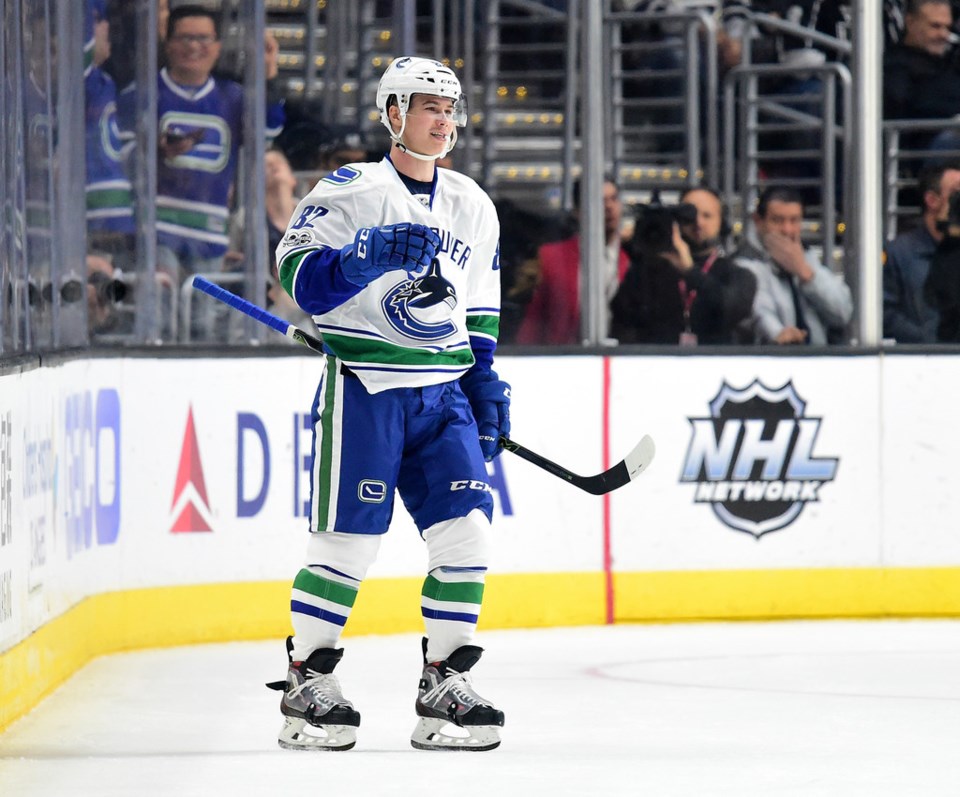Ìý
With training camp kicking off today, it’s time for those two dreaded words to rear their ugly heads: asset management.
It would be nice if putting together an NHL roster could be based purely on merit, but the goal of putting together the roster isn’t simply to create your best lineup for opening night, but the strongest team through the months to come. That means ensuring organizational depth that can handle the injuries, illnesses, and that inevitably happen in the long grind of an NHL season.
And that can mean putting players in the minors that might deserve to make the Canucks out of camp, simply because of their waiver eligibility.
Players are exempt from waivers during the early years of their career based on . Those factors can get complicated, which is why NHL video games make it simple by making waivers based on one-way and two-way contracts. That simplification has misled an entire generation of NHL fans, so let’s be clear: waivers has nothing to do with one-way and two-way contracts.
Players who are not exempt have to go through waivers to be sent down to the AHL. This allows other NHL teams a chance to claim those players for their own roster. This benefits the players who get to stay in the NHL rather than get reassigned to the minors.
Why does this matter for the Canucks? Because they have some waiver-exempt young players pushing to make the roster this preseason and, in order for them to make the team, the Canucks could risk losing a player or two on waivers.
The Canucks have 16 forwards that are not exempt from waivers, so it’s guaranteed that some forwards cut from training camp will hit the waiver wire. Brendan Gaunce is injured, so we can set him aside. The 16 forwards also include Jayson Megna and Michael Chaput, who are fairly safe bets to be sent down to Utica.
That brings the number down to 13 forwards. The Canucks will carry either 13 or 14 forwards on their roster, depending on how many defencemen they decide to keep up with the Canucks, so you can already see that from an asset management point of view, the easiest thing to do would be to send the waiver exempt forwards down to Utica to start the season.
It’s not that simple when you look at those players on the bubble. The forwards exempt from waivers that are most likely to make the Canucks out of camp are Brock Boeser, Nikolai Goldobin, and Jake Virtanen. There are also longshots like Michael Carcone, Zack MacEwen, or Griffen Molino who could shock everyone with a fantastic preseason, but they’re far more likely to start the season in Utica.
There’s an argument to be made for all three young prospects: Boeser excelled in his brief stint last season, Goldobin has already dominated at the AHL level, and Virtanen fills a potential need on the fourth line.
If the Canucks carry 14 forwards, there’s room for one of those three without exposing a potentially valuable player on waivers. If they only carry 13, or the Canucks want two or more of Boeser, Goldobin, or Virtanen on the team, then the Canucks risk losing a player.
The most likely waiver eligible candidates are Reid Boucher, Anton Rodin, and Alexander Burmistrov. While some might argue that the Canucks should waive Derek Dorsett, the Canucks likely value his veteran leadership too much for that to happen.
Boucher was already waived three times last season, but was claimed each time. Rodin could potentially slip through waivers if teams are concerned about his knee, but all it would take is one team willing to take a chance on the former SHL MVP. Burmistrov might be the most likely to get through waivers, but that would mean moving Sam Gagner or Markus Granlund from the wing to play fourth-line centre.
The situation on defence complicates matters: the Canucks have 10 defencemen who are not exempt from waivers. This is why the Canucks might decide to carry 8 defencemen and just 13 forwards out of camp.
The 10 waiver-eligible players starts with the presumed top-seven: Edler, Tanev, Hutton, Stecher, Del Zotto, Gudbranson, and Weircioch. Then there’s Alex Biega and Andrey Pedan, who seem like sure candidates to get waived and sent to Utica.
Where it gets interesting is the 10th defenceman on the list: Evan McEneny. There are quite a few people in the Canucks’ organization who are high on McEneny and may not be keen on the Canucks losing him on waivers. McEneny played big minutes for Travis Green’s Comets and earned a brief call-up to the Canucks last season.
That makes it tough for the Canucks’ waiver-exempt defencemen, like Olli Juolevi, Jordan Subban, Philip Holm, Jalen Chatfield, and Guillaume Brisebois. Juolevi has the best shot of this group, simply because once he’s either sent down to the OHL or lent to a team in Finland, he can’t be called back up.
Are the Canucks willing to lose a young player on waivers just to give Juolevi a nine-game look in the NHL? Considering his lukewarm performance at the Young Stars tournament, you have to think it would take a stunning preseason for Juolevi to get that opportunity.
Meanwhile, Subban will almost certainly have to wait for injuries to get a chance at his first NHL game and will have to contend with the likes of Holm and Chatfield to be the first call-up.
So, this is the situation: for Brock Boeser to make the Canucks out of camp, someone else will have to get injured or one of Boucher, Rodin, Burmistrov, or McEneny will have to go on the waiver wire. If you want to see Nikolai Goldobin or Jake Virtanen, cross another name off that list.
This is certainly not the worst problem to have, but organizational depth can get a lot more shallow when players get plucked off waivers.
Ìý



